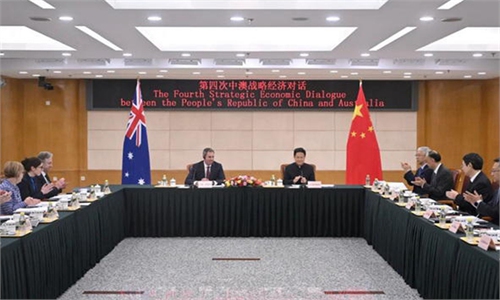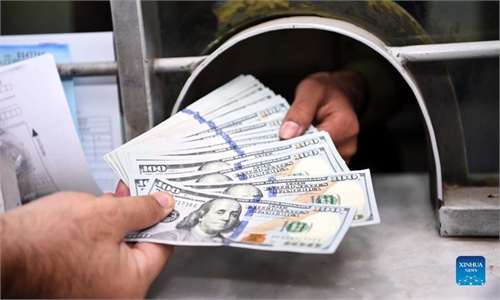
Photo: VCG
This year is the first year following the expansion of BRICS, and the first post-expansion summit will be held in Kazan, Russia, from October 22 to 24. Concurrently with the summit, the new payment system BRICS Pay has drawn attention, highlighting the strengthening of economic and trade ties among BRICS countries.
Russia, which chairs the BRICS group this year, has called on its partners to create an alternative to the International Monetary Fund to counter political pressure from Western nations ahead of the BRICS summit later this month, according to Reuters.
Russian Finance Minister Anton Siluanov, who is hosting the meeting, said the global financial system is controlled by Western countries and that the group, which represents 37 percent of the global economy, needs to create an alternative, Reuters reported.
New payment system
According to the BRICS Pay official website, it is being described as a potential "cornerstone for payments for sovereign and prosperous nations."
Chinese experts said that this initiative will provide BRICS countries with expanded payment options for settling goods and services, further solidifying their economic relationships.
Additionally, this approach may help reduce excessive reliance on the US dollar, balance the dollar's dominance, foster financial diversification, and bolster economic autonomy among BRICS members and beyond, experts noted.
The BRICS countries have been actively developing a new international payment system. According to Russian media outlet RT, citing a recent interview with Siluanov, that "the new cross-border payment infrastructure will be based on advanced technologies and will enable faster and cheaper foreign trade transactions that are without external interference."
BRICS Pay is a decentralized, independent payment messaging system under development by the BRICS member states, comparable to Europe's SWIFT.
On Thursday and Friday, during the BRICS Business Forum at the International Trade Center in Moscow, users can participate in testing the retail technologies of BRICS Pay, according to BRICS Pay's official website.
BRICS Pay has been in development for several years. As early as 2019, BRICS countries have been working on establishing a unified payment system as part of a retail payment and remittance platform for member nations, according to media reports.
A year later, the 12th BRICS Summit Moscow Declaration, which was released on November 17, 2020, commended continuing work on the national payments systems' cooperation, in particular, the creation of the BRICS Payments Task Force and look forward to further progress on this track, the Xinhua News Agency reported.
Experts noted that the new payment system - BRICS Pay - emerges at a time when nations, especially developing ones, seek to better safeguard their economic sovereignty while seeking to expand cooperation.
"As a group of emerging market countries, the significance of launching such a payment system for BRICS is evident... It carries practical implications for safeguarding the economic sovereignty of developing countries and expanding economic and trade cooperation," Song Wei, a professor at the School of International Relations and Diplomacy at Beijing Foreign Studies University, told the Global Times on Wednesday.
BRICS countries are now among the most significant economic powers in the world. Russia assumed the rotating presidency of BRICS for 2024 on January 1 of this year. On the same day, Saudi Arabia, Egypt, the UAE, Iran, and Ethiopia officially joined as BRICS members, doubling the number of member countries from five to 10.
Song said that this new payment system could deepen economic collaboration among BRICS nations, promoting trade and investment partnerships, allowing these countries to utilize their economic influence to drive global economic recovery.
Moreover, this settlement system may serve as a pilot for multilateral cooperation, including the Belt and Road Initiative (BRI), Song said.
As the BRI continues to embrace high-quality development, focused on deepening economic cooperation, there will be an expectation to find a need to explore ways to facilitate trade-related investment settlements, Song said.
De-dollarization trend
The trend of de-dollarization has been accelerating over recent years, driven by the US wielding its financial sanctions, leading some countries to be unable to settle in dollars and driving them to seek alternative payment systems, Chinese experts said, referring another major reason for having an alternative way of payment rather than the dollar.
For a long time, the US has abused its dollar hegemony, shifting domestic crises and harvesting global wealth by damaging the economic and financial stability and well-being of other countries, experts said.
The establishment of the BRICS payment system poses a significant challenge to the US dollar's dominance, Wang Peng, an associate research fellow at the Beijing Academy of Social Sciences, told the Global Times on Wednesday.
"For a long time, the US dollar has maintained a dominant role in the international financial system, leaving many countries vulnerable to exchange rate risks and economic pressures... a BRICS payment system will help to reduce reliance on the dollar and offer member nations more independent and secure payment alternatives," Wang further noted.
A diversified competitive landscape in trade settlement, investment, and reserves is needed to better balance the interests of all parties, experts said, suggesting that this will also foster a new form of cooperation among countries at various levels and stages of development, with the goal of creating a more inclusive and balanced international monetary system.



